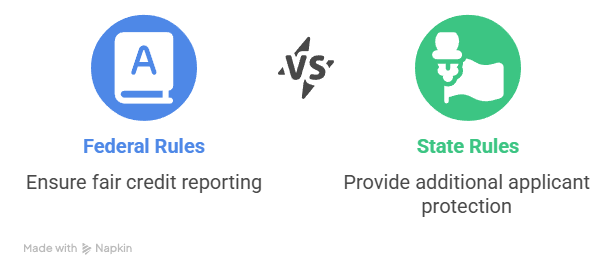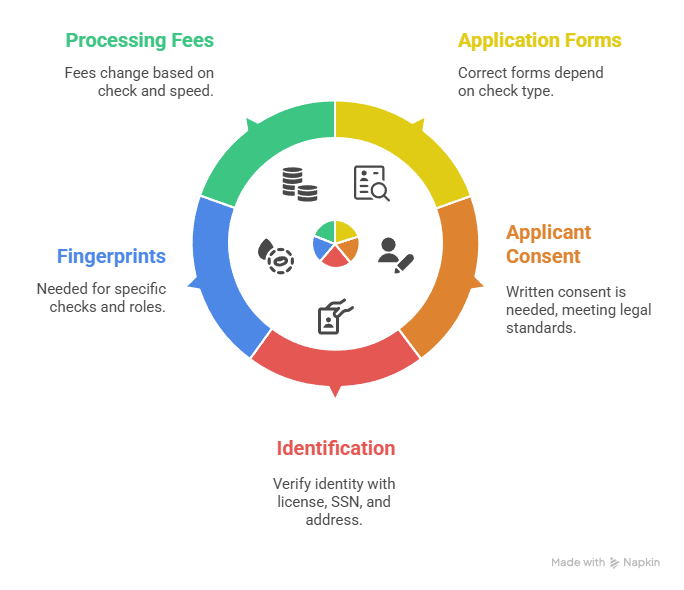Pennsylvania criminal background checks help employers make smart hiring choices while following state and federal rules. Knowing the right steps, legal needs, and worker rights keeps screening fair for both employers and job seekers.
Key Takeaways
- Pennsylvania employers must follow both state and federal laws when conducting criminal background checks, including the Fair Credit Reporting Act (FCRA) and Pennsylvania's Clean Slate Law.
- The state offers multiple background check options including Pennsylvania State Police criminal history records, FBI fingerprint checks, and county-level court records.
- Employers cannot ask about criminal history on initial job applications but may inquire after extending a conditional job offer in most cases.
- Certain automatic expungements and sealed records under Pennsylvania's Clean Slate Law may not appear on background checks, affecting what employers can see.
- Job applicants have specific rights including the ability to dispute inaccurate information and receive copies of background check reports used in hiring decisions.
- Different industries and positions have varying background check requirements, with some roles requiring enhanced screening procedures for sensitive positions.
Understanding Pennsylvania's Legal Framework for Background Checks
Pennsylvania criminal background check laws create a complex system that balances what employers need with worker protections. The state works under both federal FCRA rules and Pennsylvania-specific laws, including the Clean Slate Law from 2018. This system greatly affects how employers do screening and what information shows up during hiring.
The Pennsylvania Human Relations Act stops discrimination based on criminal history in most cases. It requires employers to show job connection when making bad hiring choices. Also, the state's Clean Slate Law automatically hides certain non-violent crimes after ten years and small offenses after five years. These hidden records usually don't show on regular background checks. This creates important points for both employers and job seekers going through the screening process.
Meanwhile, employers must understand that compliance involves more than just following rules. It means creating fair hiring practices that protect everyone involved. The law changes often, so staying updated helps prevent costly mistakes. Furthermore, proper training for HR staff ensures consistent application of these complex requirements.
Federal vs. State Compliance Requirements

Pennsylvania employers must follow both federal and state rules at the same time. The Fair Credit Reporting Act (FCRA) controls how employers use outside background check services. It requires written permission, pre-action notices, and final notices when criminal history affects hiring choices.
State-level rules add more protection layers for job applicants. Pennsylvania's ban-the-box rules limit when employers can ask about criminal history. They usually stop such questions on first applications. However, these limits change by employer type and job sensitivity. This creates detailed compliance needs that need careful attention to legal details.
Types of Pennsylvania Criminal Background Checks Available
Pennsylvania offers several different background check options. Each provides different information levels and serves specific screening purposes. Understanding these differences helps employers pick the right screening tools while ensuring complete coverage of relevant criminal history information. The choice between state-level, federal, and county-specific checks often depends on job needs, industry rules, and company risk policies.
The most common Pennsylvania criminal background check types include Pennsylvania State Police criminal history records, FBI fingerprint-based checks, and county court record searches. Each method accesses different databases and timeframes. This potentially reveals different information about an applicant's criminal history. Employers typically combine multiple check types to create complete screening plans that meet their specific needs and legal requirements.
Additionally, employers should know that different check types have different costs and processing times. Some checks work better for certain industries or job types. Therefore, planning ahead helps ensure timely hiring decisions without compromising thoroughness.
| Check Type | Information Provided | Processing Time |
| PA State Police Criminal History | Statewide arrests, charges, dispositions | 3-5 business days |
| FBI Fingerprint Check | National criminal history, federal records | 7-14 business days |
| County Court Records | Local convictions, pending cases, traffic violations | 1-3 business days |
Modern background check processes increasingly rely on digital platforms that make applications and results delivery easier. However, certain jobs still need traditional fingerprint submissions and paper-based processing. This is especially true for roles involving vulnerable populations or security-sensitive functions.
Pennsylvania State Police Criminal History Records
Pennsylvania State Police keep detailed criminal history databases covering arrests, charges, and case outcomes throughout the state. These records include information from all 67 Pennsylvania counties. This gives employers statewide coverage of an applicant's criminal history within state borders.
The Pennsylvania State Police system processes both name-based and fingerprint-based searches. Fingerprint checks usually give more accurate results. Name-based searches may return records for people with similar names. This requires extra verification steps to ensure accuracy. Processing times typically range from three to five business days for standard requests. However, faster options may be available for certain industries or urgent hiring needs.
The Application Process for Pennsylvania Background Checks
Starting a Pennsylvania criminal background check needs careful attention to procedure requirements and documentation standards. Employers must get proper consent, select appropriate check types, and submit complete applications to avoid processing delays or compliance violations. The application process changes depending on whether employers use third-party screening services or submit requests directly to relevant agencies.
Most employers choose third-party background check providers to make the process easier and ensure FCRA compliance. These services typically offer online platforms where employers can submit requests, track processing status, and receive detailed reports. However, some jobs or industries need direct submissions to the Pennsylvania State Police or other agencies. This means knowing multiple application procedures and requirements.
First, employers need to understand what documentation they need before starting any background check. Missing paperwork causes delays and frustrates both employers and job applicants. Next, choosing the right type of check saves time and money while meeting legal requirements. Finally, following up on applications ensures timely completion of the hiring process.
Required Documentation:

- Completed Application Forms: Proper forms vary by check type and submission method
- Applicant Consent: Written authorization meeting FCRA standards and Pennsylvania requirements
- Identification Verification: Driver's license, social security number, and address history
- Fingerprints: Required for certain check types and sensitive positions
- Processing Fees: Vary by check type and expedited service options
The digital transformation of background check processes has made many application procedures simpler while keeping security standards. Online portals allow real-time status tracking and secure results delivery. This reduces administrative work for HR professionals. However, certain high-security jobs still need in-person fingerprinting and traditional paper-based submissions to meet regulatory standards.
Furthermore, employers should establish clear timelines for background check completion. This helps manage applicant expectations and ensures hiring processes stay on track. Also, having backup plans for delayed results prevents unnecessary hiring delays.
Required Documentation and Forms
Successful Pennsylvania criminal background check applications depend on complete and accurate documentation submission. The Pennsylvania State Police need specific forms depending on the type of check requested. There are different requirements for employment screening versus volunteer positions or professional licensing. Form SP 4-164 serves as the standard application for employment-related criminal history checks. Other specialized forms may be necessary for specific industries.
Applicant identification requirements include government-issued photo identification, social security numbers, and complete address history covering the past seven years. Incomplete or wrong information often causes processing delays or needs resubmission. This extends hiring timelines and creates administrative problems for employers managing multiple applicant screenings at once.
What Information Appears on Pennsylvania Background Checks
Pennsylvania criminal background checks show detailed information about a person's interactions with the criminal justice system. However, recent law changes have limited what employers can access. Understanding the scope and limits of available information helps employers make informed decisions while respecting applicant privacy rights. The type and extent of information changes significantly based on the screening method selected and the applicant's criminal history timeline.
Standard Pennsylvania background checks typically include arrest records, criminal charges, court decisions, and sentencing information from state and local jurisdictions. However, the Clean Slate Law has automatically sealed certain records. This removes them from standard background check results. This creates situations where employers may have incomplete information about an applicant's full criminal history. This is especially true for older, non-violent offenses that qualify for automatic sealing.
Moreover, employers need to understand the difference between what they can see and what they can legally use in hiring decisions. Just because information appears on a background check doesn't mean it's relevant to the job. Therefore, training hiring managers on proper evaluation techniques becomes essential for legal compliance.
Information Categories Typically Included:
- Felony Convictions: All felony convictions regardless of age, including violent and non-violent offenses
- Recent Misdemeanors: Misdemeanor convictions within the past ten years that don't qualify for sealing
- Pending Charges: Current criminal cases that haven't reached final disposition
- Summary Offenses: Minor violations within the past five years, excluding sealed records
The distinction between arrests and convictions becomes crucial when interpreting background check results. Pennsylvania law generally prohibits employment discrimination based solely on arrests that didn't result in convictions. However, exceptions exist for certain industries and security-sensitive positions. Employers must carefully evaluate the job-relatedness of any criminal history information when making hiring decisions to avoid potential discrimination claims.
Additionally, employers should establish clear policies about how they evaluate different types of criminal history information. Consistent application of these policies protects against discrimination claims while ensuring fair treatment of all applicants.
Understanding Sealed and Expunged Records
Pennsylvania's Clean Slate Law fundamentally changed what information appears on criminal background checks by automatically sealing eligible records. Non-violent misdemeanor convictions disappear from standard background checks after ten years. Summary offenses become sealed after five years. This automatic process happens without requiring individual petitions. It significantly reduces the criminal history information available to employers.
Traditional expungement procedures still exist for records that don't qualify for automatic sealing. This allows individuals to petition courts for record removal. Successfully expunged records should not appear on any background check results. However, occasional database inconsistencies may cause sealed or expunged information to surface inappropriately. This requires correction through proper legal channels.
Employer Rights and Responsibilities
Pennsylvania employers have significant rights to conduct criminal background checks while bearing corresponding responsibilities to ensure legal compliance and fair treatment of applicants. These rights include the ability to request comprehensive criminal history information, verify applicant credentials, and make employment decisions based on relevant criminal history findings. However, these rights come with substantial obligations to follow proper procedures, respect applicant privacy, and avoid discriminatory practices.
The balance between employer rights and applicant protections requires careful navigation of federal and state regulations. Employers must demonstrate legitimate business reasons for conducting background checks. They must also show job-relatedness when adverse employment actions result from criminal history findings. This standard particularly applies to positions that don't involve direct safety risks or access to sensitive information. In such cases, blanket criminal history exclusions may violate anti-discrimination laws.
Responsible background check practices protect employers from negligent hiring claims while ensuring fair treatment of applicants with criminal histories. Documentation of screening procedures, consistent application of policies, and proper training of HR personnel help organizations maintain compliance while achieving their risk management objectives. Regular policy reviews and legal updates ensure continued compliance as regulations evolve and court interpretations develop.
Furthermore, employers should create written policies that clearly outline their background check procedures. These policies should specify what types of criminal history information will disqualify candidates for different positions. This transparency helps ensure consistent application and reduces the risk of discrimination claims.
Ban-the-Box Compliance Requirements
Pennsylvania's ban-the-box legislation restricts when employers can inquire about applicant criminal history. It generally prohibits such questions on initial job applications. These requirements apply to most private employers with specific exceptions for positions involving vulnerable populations, security functions, or roles with statutory background check requirements. Understanding these nuances prevents inadvertent compliance violations while maintaining effective screening procedures.
Employers typically can inquire about criminal history after extending conditional job offers. This allows initial candidate evaluation based on qualifications rather than criminal background. However, the timing and manner of such inquiries must follow specific procedural requirements. This ensures compliance with both state and federal anti-discrimination laws.
Employee and Applicant Rights
Job applicants and employees maintain significant rights throughout the Pennsylvania criminal background check process. These include the right to accurate information, fair treatment, and proper notification of adverse actions. These protections stem from both federal FCRA requirements and Pennsylvania state laws designed to prevent discrimination and ensure due process. Understanding these rights helps individuals navigate the screening process effectively while protecting their employment opportunities.
The right to dispute inaccurate information represents one of the most important protections available to applicants. Background check errors occur frequently due to database inconsistencies, identity confusion, or outdated information that should have been sealed or expunged. Applicants have specific timeframes and procedures for challenging incorrect information. This potentially prevents unfair employment consequences based on inaccurate data.
Meanwhile, applicants should know that they have the right to receive copies of any background check reports used in hiring decisions. This transparency helps ensure accuracy and provides opportunities to correct errors before they affect employment opportunities. Also, applicants can request information about how their criminal history information will be used in the hiring process.
Key Applicant Rights Include:

- Advance Notice: Right to know when background checks will be conducted and what information will be sought
- Written Consent: Requirement for explicit authorization before background check initiation
- Report Access: Right to receive copies of background check reports used in employment decisions
- Dispute Procedures: Ability to challenge inaccurate or incomplete information through proper channels
- Adverse Action Notifications: Right to receive specific information when criminal history affects employment decisions
Legal remedies exist for applicants who experience discrimination or procedural violations during background check processes. These may include filing complaints with state agencies, pursuing federal discrimination claims, or seeking damages through civil litigation. However, successful claims typically require documentation of specific violations and evidence of discriminatory treatment rather than general dissatisfaction with background check results.
Additionally, applicants should understand that certain rights apply even after they're hired. For example, if ongoing background checks are required for their position, they maintain rights to accuracy and fair treatment throughout their employment.
Disputing Inaccurate Background Check Information
Inaccurate background check information can significantly impact employment opportunities. Therefore, the dispute process becomes crucial for affected individuals. Common errors include outdated records that should have been sealed, mismatched identity information, and incomplete disposition details that fail to reflect case outcomes. The dispute process typically involves contacting both the background check provider and the original information source to request corrections.
Time sensitivity becomes critical when disputing background check errors, particularly during active job application processes. While investigations proceed, applicants should document all communications, gather supporting evidence, and maintain records of correction requests. This ensures proper resolution and prevents future occurrences of the same errors.
Industry-Specific Background Check Requirements
Different industries operating in Pennsylvania face varying criminal background check requirements based on regulatory frameworks, client safety considerations, and statutory mandates. Healthcare, education, financial services, and transportation sectors typically require enhanced screening procedures that exceed standard employment background checks. These industry-specific requirements often mandate particular check types, specify disqualifying offenses, and establish ongoing monitoring obligations for employers.
Understanding industry-specific requirements prevents compliance violations while ensuring appropriate screening intensity for different risk levels. Some sectors require fingerprint-based FBI checks, professional licensing background verification, and periodic re-screening of existing employees. These enhanced requirements reflect the sensitive nature of certain positions and the potential consequences of criminal behavior in specific professional contexts.
Healthcare positions often require the most comprehensive background check procedures. These include state and federal criminal history checks, professional license verification, and exclusion database searches. Educational roles involving minors typically mandate child abuse clearances in addition to standard criminal background checks. Financial services positions may require credit checks alongside criminal history verification to assess trustworthiness and financial responsibility.
Moreover, employers in regulated industries should stay updated on changing requirements through professional associations and regulatory agencies. These organizations often provide guidance on best practices and compliance updates that help employers maintain appropriate screening standards.
| Industry | Required Check Types | Disqualifying Factors |
| Healthcare | Criminal history, license verification, exclusion databases | Patient abuse, drug offenses, fraud |
| Education | Criminal history, child abuse clearance | Crimes against children, violent offenses |
| Financial Services | Criminal history, credit check | Financial crimes, theft, fraud |
Regular monitoring of industry-specific regulatory changes ensures continued compliance as requirements evolve. Professional associations, licensing boards, and regulatory agencies often update background check standards. This requires employers to adapt their screening procedures accordingly.
Furthermore, employers should understand that industry requirements may override general state background check limitations. For example, certain healthcare positions may require disclosure of sealed records that wouldn't appear on standard employment background checks.
Healthcare and Education Sector Requirements
Healthcare employers in Pennsylvania must navigate complex federal and state background check requirements designed to protect patient safety and maintain professional standards. The Centers for Medicare & Medicaid Services require exclusion database checks to ensure healthcare workers haven't been barred from federal healthcare programs. State licensing boards impose additional criminal history requirements that vary by profession and practice setting.
Educational institutions face similar complexity when screening employees who work with minors. Pennsylvania requires child abuse clearances through the Department of Human Services, FBI fingerprint checks for certain positions, and ongoing monitoring obligations for existing staff. These layered requirements reflect the heightened responsibility to protect vulnerable populations while maintaining educational program integrity.
Cost Considerations and Processing Times
Pennsylvania criminal background checks involve various costs that depend on the type of check requested, processing method, and urgency of results. Understanding these cost structures helps employers budget appropriately while selecting the most cost-effective screening options for their needs. Processing times also vary significantly, affecting hiring timelines and requiring careful planning to avoid delays in critical hiring decisions.
Standard Pennsylvania State Police criminal history checks typically cost between $10-$20 for employment purposes. FBI fingerprint-based checks generally range from $18-$24, not including additional fees for fingerprinting services. County-level searches may cost $5-$15 per jurisdiction, though costs can add up quickly when searching multiple counties. Third-party background check services often bundle these searches with additional fees for convenience and compliance management.
Processing times create another important consideration for employers managing hiring timelines. Rush processing options exist for certain check types but typically involve additional fees. Planning background checks early in the hiring process helps avoid delays while ensuring thorough screening. Also, having clear communication with applicants about expected timelines reduces anxiety and maintains positive candidate experiences.
Typical Cost Ranges:
- PA State Police Check: $10-$20 per applicant
- FBI Fingerprint Check: $18-$24 plus fingerprinting fees
- County Court Search: $5-$15 per county
- Third-Party Service Fees: $25-$75 for comprehensive packages
Employers should also consider hidden costs associated with background check delays, such as extended job vacancy periods or lost productivity from delayed hiring decisions. Investing in efficient screening processes often provides better returns than choosing the cheapest options available.
Budgeting for Comprehensive Screening Programs
Developing effective budgets for comprehensive background screening programs requires understanding both direct costs and indirect expenses associated with various screening options. Direct costs include application fees, processing charges, and third-party service fees. Indirect costs encompass staff time for managing applications, delays in hiring processes, and potential legal expenses from compliance violations.
Employers can reduce costs through volume pricing agreements with background check providers, streamlined application processes, and strategic selection of check types based on position requirements. However, cost savings should never compromise compliance requirements or screening effectiveness, as the expenses associated with negligent hiring or discrimination claims far exceed screening costs.
Technology and Digital Transformation in Background Checks
Technology has revolutionized Pennsylvania criminal background checks by making processes faster, more accurate, and easier to manage. Digital platforms now handle most background check applications, provide real-time status updates, and deliver secure results directly to employers. This transformation has reduced paperwork, shortened processing times, and improved overall efficiency for both employers and screening agencies.
Online background check systems offer several advantages over traditional paper-based processes. They reduce data entry errors through automated validation, provide instant confirmation of application receipt, and enable electronic storage of results for compliance purposes. Mobile-friendly platforms allow HR professionals to manage background checks from anywhere, improving flexibility and responsiveness in hiring processes.
However, technology also brings new challenges, including data security concerns, system compatibility issues, and the need for staff training on new platforms. Employers must ensure that digital background check providers maintain appropriate security measures and comply with all relevant privacy regulations. Regular system updates and cybersecurity protocols protect sensitive applicant information from unauthorized access or data breaches.
Additionally, artificial intelligence and machine learning technologies are beginning to improve background check accuracy and efficiency. These technologies can help identify potential errors, flag inconsistencies, and provide better matching of records to specific individuals. As these technologies continue to develop, they promise to make background checks even more reliable and efficient.
Future developments in background check technology may include blockchain verification systems, improved biometric identification methods, and enhanced integration with other HR systems. Staying informed about these developments helps employers make strategic decisions about their background check processes and technology investments.
Conclusion
Navigating Pennsylvania criminal background check requirements demands careful attention to evolving legal frameworks, procedural requirements, and stakeholder rights. Employers must balance legitimate business needs with fair treatment of applicants, while job seekers should understand their rights and available remedies when facing screening processes. The implementation of Clean Slate legislation has significantly changed the landscape by automatically sealing certain records and affecting what information appears on background checks. Success in this environment requires ongoing education about regulatory changes, consistent application of compliant procedures, and recognition that effective background check practices protect all parties involved while supporting informed employment decisions. Therefore, staying current with legal developments and maintaining fair, consistent screening practices creates the best outcomes for everyone in Pennsylvania's employment market.
Frequently Asked Questions
How long does a Pennsylvania criminal background check take?
Pennsylvania criminal background checks typically take 3-5 business days for state police records and 7-14 business days for FBI fingerprint checks. County-level searches often complete within 1-3 business days. Processing times may vary based on application volume, accuracy of submitted information, and whether expedited services are requested.
Can employers ask about criminal history on job applications in Pennsylvania?
Most Pennsylvania employers cannot ask about criminal history on initial job applications due to ban-the-box legislation. Employers can typically inquire about criminal background after extending conditional job offers, though exceptions exist for certain industries and security-sensitive positions that have specific regulatory requirements.
What criminal records are automatically sealed in Pennsylvania?
Pennsylvania's Clean Slate Law automatically seals non-violent misdemeanor convictions after 10 years and summary offenses after 5 years, provided individuals have remained arrest-free during the waiting period. These sealed records typically don't appear on standard background checks, though some exceptions may apply for certain regulated industries.
Do I have the right to see my background check report?
Yes, under the Fair Credit Reporting Act (FCRA), applicants have the right to receive copies of background check reports used in employment decisions. If employers take adverse actions based on background check information, they must provide pre-adverse action notices and final adverse action letters with specific dispute procedure information.
Can I dispute incorrect information on my Pennsylvania background check?
Applicants can dispute inaccurate background check information by contacting both the background check provider and the original information source. The dispute process typically involves submitting correction requests with supporting documentation, and investigations must be completed within reasonable timeframes as required by federal and state law.
Are there different background check requirements for different jobs in Pennsylvania?
Yes, background check requirements vary significantly by industry and position type. Healthcare workers may need professional license verification and exclusion database checks, education employees often require child abuse clearances, and financial services positions might mandate credit checks in addition to standard criminal history verification.
Additional Resources
- Pennsylvania State Police Criminal History Record Information
https://www.psp.pa.gov/Pages/Record-Requests.aspx - Fair Credit Reporting Act Guidelines for Employers
https://www.ftc.gov/business-guidance/resources/using-consumer-reports-what-employers-need-know - Pennsylvania Human Relations Commission Employment Discrimination Information
https://www.phrc.pa.gov/Employment/Pages/default.aspx - Clean Slate Limited Access Information - Pennsylvania Courts
https://www.pacourts.us/news-and-statistics/news-of-the-courts/clean-slate - Pennsylvania Department of Human Services Background Check Requirements
https://www.dhs.pa.gov/Services/Assistance/Pages/Background-Checks.aspx - Equal Employment Opportunity Commission Criminal Background Check Guidelines
https://www.eeoc.gov/laws/guidance/arrest-conviction-records-employment-decisions-eeoc-enforcement-guidance

GCheck Editorial Team
Meet the GCheck Editorial Team, your trusted source for insightful and up-to-date information in the world of employment background checks. Committed to delivering the latest trends, best practices, and industry insights, our team is dedicated to keeping you informed.
With a passion for ensuring accuracy, compliance, and efficiency in background screening, we are your go-to experts in the field. Stay tuned for our comprehensive articles, guides, and analysis, designed to empower businesses and individuals with the knowledge they need to make informed decisions.
At GCheck, we're here to guide you through the complexities of background checks, every step of the way.






